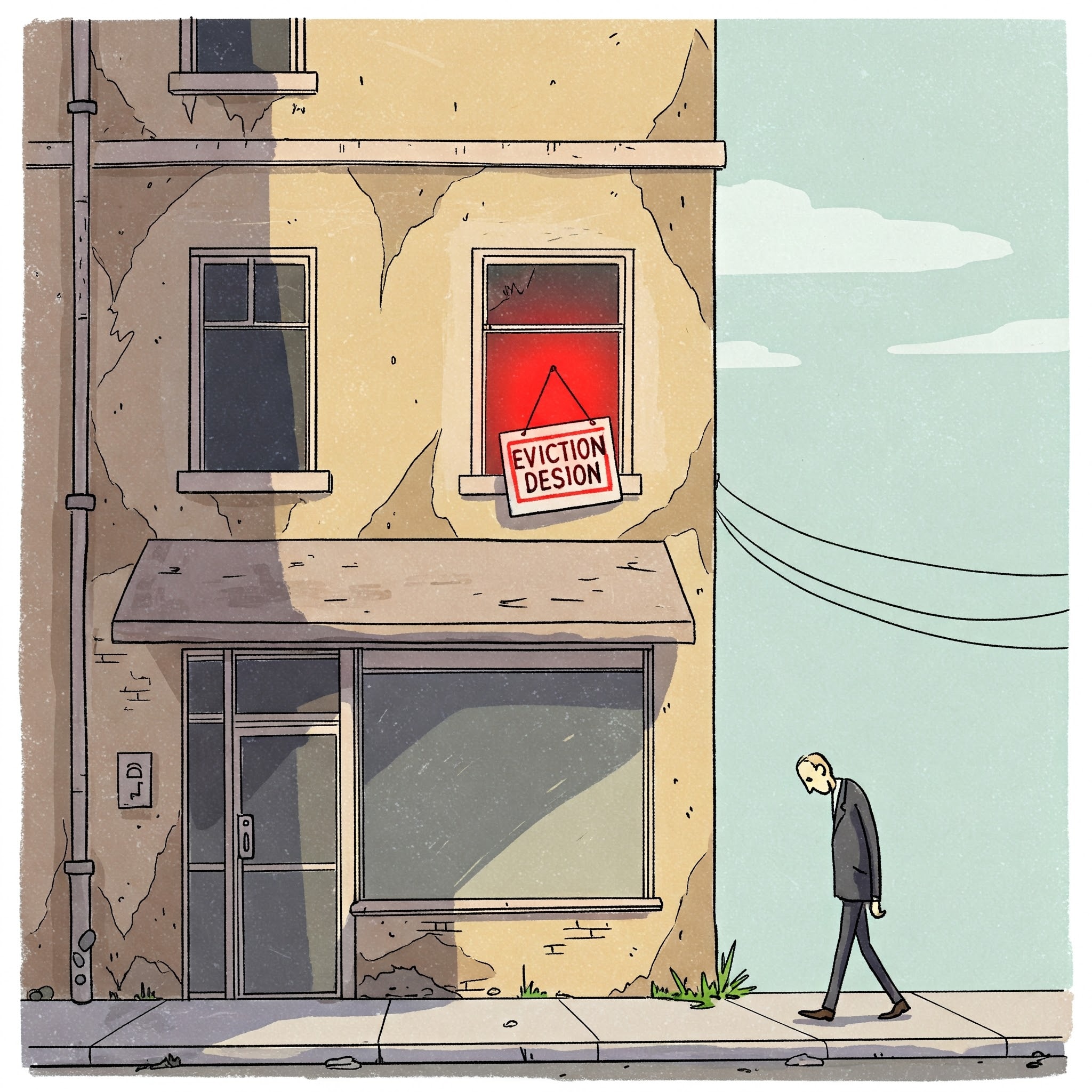Rental debt is the unpaid rent tenants owe, which can cause significant financial strain for both sides involved. It can lead to evictions, damaged credit scores, and legal challenges. In this article, we dive into what rental debt entails, its impact, and practical solutions for both tenants and landlords.
Key Takeaways
Rental debt affects millions, with over $10 billion owed nationwide, creating stress for tenants and financial strain for landlords.
Tenants have rights under the Fair Debt Collection Practices Act (FDCPA) to dispute debts and protect themselves from abusive collection practices.
Proactive communication, thorough tenant screening, and clear rental policies are essential for both tenants and landlords to prevent and manage rental debt effectively.
Join the Wait List and Get 50% Off Your Subscription
Understanding Rental Debt

Rent debt, defined as money owed to landlords for unpaid rent from previous months, is a significant financial burden affecting millions of households. When tenants fail to pay their rent, it leads to accumulated unpaid amounts, creating a challenging situation for both tenants and landlords. The nationwide total of rent debt owed by tenants is staggering, exceeding $10 billion, with approximately 5 million households currently behind on their rent payments.
Understanding the causes and consequences of rental debt is essential for both parties involved. For tenants, rental debt can lead to eviction, stress, and long-term financial repercussions, while landlords face disruptions to their rental income and strained relationships with tenants.
Identifying root causes and addressing the consequences allows both tenants and landlords to manage and resolve rental debt more effectively.
Causes of rental debt
Rental debt often arises from various challenges renters face in their financial lives. Common contributors include loss of employment, sudden expenses, and health-related issues, which can create significant financial strain and make it difficult for tenants to meet their rental obligations.
Understanding these common causes can help tenants take proactive steps to manage their finances effectively and prevent rental debt from accumulating.
Consequences for tenants
When tenants cannot pay rent, the consequences can be severe and far-reaching. Here are some immediate consequences:
Potential for eviction, which can lead to housing instability and significant stress for tenants.
Missed rental payments often result in late fees, further exacerbating the financial burden and straining the relationship between tenants and landlords.
Tenants may experience collection calls and potential legal actions due to unpaid rent.
The negative impact on credit scores is another significant consequence of rental debt. When rental debt is turned over to collections, it can severely affect a tenant’s credit score, with collection accounts remaining on credit reports for up to seven years. This can hinder tenants’ ability to secure future housing and affect security deposit requirements.
Regularly checking credit reports and disputing invalid debts ensures accuracy and addresses any discrepancies.
Impact on landlords
Rental debt can significantly disrupt landlords’ financial stability and their overall rental income. Unpaid rent going to collections can strain relationships and affect landlords’ reputation.
As landlords rely on rental income to cover mortgage payments and maintain their properties, the financial implications of rental interest debt can be substantial.
Legal Protections and Rights for Tenants

Tenants facing collections for unpaid rent should be aware of their rights, including protection from harassment and the right to dispute the debt. During the COVID-19 pandemic, eviction policies evolved to provide tenants with protections against immediate evictions for unpaid rent, ensuring that they are not evicted without due process. When rental debt is reported to credit bureaus, it can severely impact a tenant’s credit score, with collection accounts remaining on credit reports for up to seven years. Tenants can find legal aid by contacting their local bar association or legal aid services to evict any misunderstandings about their rights.
Understanding their legal protections and rights helps tenants navigate rental debt challenges and avoid abusive practices by debt collectors. The Federal Fair Debt Collection Practices Act (FDCPA) is a crucial piece of federal legislation that safeguards tenants from abusive debt collection practices, including those that may involve breaking federal law. Additionally, tenants have the right to dispute debt claims and ensure accuracy in tenant screening reports.
Federal Fair Debt Collection Practices Act (FDCPA)
The Fair Debt Collection Practices Act (FDCPA) prohibits abusive and deceptive practices by debt collectors. Under this federal law, debt collectors are not allowed to engage in unfair, deceptive, or abusive practices when attempting to collect debts. This means that debt collectors cannot harass or threaten tenants as part of their debt collection efforts.
If a debt collector uses abusive practices, tenants have the right to submit a complaint or call the consumer protection hotline at (855) 411-2372. Knowing these protections empowers tenants to stand up against unfair treatment and seek redress if they are subjected to harassment or threats by debt collectors.
Right to dispute debt
Tenants are entitled to formally dispute claims about debts, requiring debt collectors to verify the accuracy of the debt. To exercise this right, tenants can request verification in writing within 30 days of receiving a collection notice.
This process ensures that tenants are not held accountable for invalid debts and protects their rights in debt collection proceedings.
Tenant screening reports
Mistakes in tenant screening reporting can hinder a tenant’s ability to qualify for new rental agreements, especially when they involve false or misleading statements about a person. For example, errors in these reports can lead to denied rental applications, emphasizing the importance of misleading statements accuracy.
Tenants should regularly check their tenant screening reports and dispute any inaccuracies to ensure fair treatment in the rental market.
Options for Managing and Paying Rental Debt

Tenants facing rental debt have several options for managing and paying off their obligations. One effective approach is to explore payment plans with landlords, allowing tenants to pay off overdue rent over time. Housing counselors can also assist tenants in finding resources and creating a plan to manage their rent obligations, with many HUD-approved services offering low- or no-cost help. Additionally, tenants may consider seeking assistance to ensure their rent is paid.
It’s essential for tenants to remain aware of their obligations under their lease agreements. Even if tenants are no longer residing in the rental property, they are still required to pay rent as stipulated in their lease.
Landlords may report unpaid rent to credit bureaus, which can negatively impact a tenant’s credit score if the debts remain unresolved. Proactive financial education can empower tenants to manage their finances effectively and avoid accruing rental debt.
Rental assistance programs

The U.S. The Department of Housing and Urban Development (HUD) provides a variety of programs. These programs are designed to assist tenants with their rent payments. Many local governments partner with organizations to provide financial aid specifically for tenants facing difficulties in paying rent.
Tenants can look for rental assistance programs at state and local laws organizations, local government offices, libraries, and cultural centers.
Negotiating with landlords

Tenants can propose a temporary rent reduction as part of a payment plan to accommodate their potentially financial situation. It may be beneficial for tenants to document all communications and agreements made with landlords during negotiations.
Open communication with landlords is essential for negotiating payment plans effectively and managing rental debt. It’s important to talk with landlords about these matters.
Utilizing community resources
Community organizations may offer various forms of assistance, including funds specifically designated to help individuals facing rental debt. The service 211 can help identify resources for paying rent or utility bills, connecting individuals with local assistance programs.
Utilizing community resources is essential for managing rental debt effectively, as they provide support and assistance to individuals in financial distress.
Steps Landlords Can Take to Collect Rental Debt

Landlords have several methods at their disposal to collect rental debt. Initially, landlords should review lease agreements to understand the specific terms regarding late fees and non-payment consequences. They can also communicate effectively with tenants to address overdue amounts and payment deadlines. When initial recovery efforts fail, hiring a reputable rent collection agency may be necessary.
Maintaining a proactive approach, such as using tools like Azibo, can help landlords streamline the collection process and improve payment reliability. Implementing a proactive financial analysis can help landlords identify potential risks before they escalate.
If tenants do not respond to payment arrangements, landlords may consider further legal action or hire a collection agency.
Reviewing lease agreements

Understanding the lease agreement is crucial for landlords to know the specific terms regarding late fees and non-payment consequences. A clear rent collection policy should outline expectations for rent payments and due dates. It should also specify acceptable payment methods, as well as any late fees or penalties.
Filing a claim in small claims court allows landlords to seek judgment for owed rent without the need for extensive legal representation.
Communicating with tenants
Building and maintaining a good relationship between landlords and tenants is vital, as the process of sending unpaid rent to collections can harm this relationship. Landlords should provide tenants with a clear notice detailing the overdue amount, including any late fees and the payment deadline.
Regular check-ins between landlords and tenants can proactively address financial struggles before they escalate and foster trust.
Hiring a rent collection agency

Choosing a reputable collections agency is crucial for landlords to recover unpaid rent effectively. Ensure that the collections agency complies with relevant tenant laws to protect against legal issues. Scrutinizing the reputation of a collections agency through reviews and ratings can ensure reliable service.
The right collections agency can significantly impact the likelihood of recovering unpaid rent, collecting making thorough evaluation essential. Collected data is crucial in this process.
Alternatives to Using a Collection Agency
Landlords can handle unpaid rent through options like small claims court, mediation, or obtaining rent guarantee insurance. Proactive measures by landlords can help avoid the costs associated with collection agencies. Specific alternatives include small claims court for direct recovery, mediation services for amicable resolution, and rent guarantee insurance for financial protection.
Utilizing these methods can save landlords time and money, and often yield better outcomes than pursuing collections. Exploring these alternatives enables landlords to manage unpaid rent more effectively and maintain better relationships with tenants.
Small claims court
Small claims court provides a legal avenue for landlords to recover unpaid rent without the need for a lawyer. This court is designed to handle disputes involving smaller sums of money, typically defined by state law. To file a claim in small claims court, landlords must meet certain eligibility criteria, including the amount owed and the nature of the claim.
Documentation such as the lease agreement, payment records, and communication with the tenant is critical for substantiating the claim and providing proof to prove the case. During the court hearing, both parties can present their case, after which the judge will issue a decision that may require enforcement actions to collect the debt as part of the eviction process.
Mediation services
Mediation can be an effective way to facilitate discussions between landlords and tenants to reach a mutually beneficial agreement over unpaid rent. It offers a collaborative approach where landlords and tenants can negotiate directly to resolve payment disputes rather than resorting to legal action.
Mediation provides a structured environment where landlords and tenants can negotiate payment plans for overdue rent with the help of a neutral third party. This process allows both parties to negotiate a settlement with the assistance of a neutral mediator, which can help avoid court proceedings.
Rent guarantee insurance
Rent guarantee insurance provides landlords with financial protection against the loss of rental income due to tenant defaults. This insurance offers landlords financial compensation for lost rental income when tenants fail to make payments.
Additionally, rent guarantee insurance protects landlords by ensuring they receive rental income even if tenants default on their obligations. It covers rent payments for a specified duration if a tenant fails to pay, providing essential financial security for property owners.
Preventing Future Rental Debt

Preventing future rental debt requires proactive measures from both landlords and tenants. Establishing open lines of communication with landlords can facilitate better arrangements for paying off outstanding rent. Landlords can implement proactive measures such as clear communication about rent policies and payment plans to manage rent arrears effectively. Implementing preventive measures can significantly decrease the likelihood of rental debt for both landlords and tenants.
By focusing on thorough tenant screening, clear rent collection policies, and open communication, landlords can reduce the risk of rental debt and foster a more stable rental environment. Tenants, in turn, can benefit from understanding their obligations and maintaining open communication with their landlords.
Thorough tenant screening
During the tenant screening process, landlords should conduct background checks, verify employment, and check references. Thorough tenant screening is crucial for landlords to minimize risks associated with rental debt. Each element of the tenant screening process helps to ensure that landlords select tenants who are more likely to meet their rental obligations.
Effective tenant screening reduces the likelihood of unpaid rent and associated rental debt, fostering a more stable landlord-tenant relationship.
Clear rent collection policies
Clearly outlining the implications of late payments in rental agreements can deter defaults. Providing a written copy of the rent collection policy to prospective tenants reduces confusion regarding rent payments. Making payment options flexible can increase the likelihood of timely rent payments.
Utilizing multiple payment options to accommodate tenants can lead to timely rent payments. Sending out rent reminders a few days before the due date helps ensure tenants are aware of their payment obligations.
Evaluating a tenant’s rental history can reveal past behaviors that might indicate future payment issues. Conducting thorough tenant screenings can reveal applicants’ past behaviors regarding payment, reducing the risk of future rental debt. Evaluating a tenant’s credit history can provide insights into their financial behavior and predict their ability to pay rent.
Open communication
Open communication is essential between landlords and tenants to ensure clarity and trust in the rental relationship. Proactive communication allows landlords and tenants to address potential payment issues early, helping to avoid escalation.
Positive relationships fostered through open communication lead to better cooperation and understanding between landlords and tenants. Both landlords and tenants are encouraged to engage in regular discussions to maintain a healthy rental dynamic.
Summary
Managing rental debt requires a comprehensive understanding of its causes, consequences, and available solutions. Both tenants and landlords face significant challenges, but by being informed and proactive, they can navigate these difficulties more effectively. Tenants should be aware of their legal protections and rights, utilize available assistance programs, and maintain open communication with landlords.
For landlords, employing thorough tenant screening, clear rent collection policies, and exploring alternatives to collection agencies can significantly improve the likelihood of recovering unpaid rent. By taking preventive measures and fostering positive relationships, both parties can work towards a more stable and cooperative rental environment. Remember, proactive steps today can prevent rental debt tomorrow.
Frequently Asked Questions
What is rental debt?
Rental debt refers to the money owed to landlords due to unpaid rent from previous months. It builds up when tenants miss payments, placing financial pressure on both tenants and landlords.
How can tenants manage rental debt?
Tenants can effectively manage rental debt by negotiating payment plans with landlords, accessing rental assistance programs, and leveraging community resources. Maintaining open communication with landlords is essential for navigating these challenges.
What legal protections do tenants have against abusive debt collection practices?
Tenants are protected by the Federal Fair Debt Collection Practices Act (FDCPA), which prohibits unfair and abusive practices by debt collectors. They have the right to dispute debt claims and request verification of debts.
What steps can landlords take to collect rental debt?
To effectively collect rental debt, landlords should review lease agreements and maintain clear communication with tenants. They can also consider hiring rent collection agencies or exploring legal avenues such as small claims court or mediation services.
How can future rental debt be prevented?
To prevent future rental debt, implement thorough tenant screening, establish clear rent collection policies, and maintain open communication between landlords and tenants. These proactive measures can significantly mitigate the risk of accumulating debt.
Leave a Reply